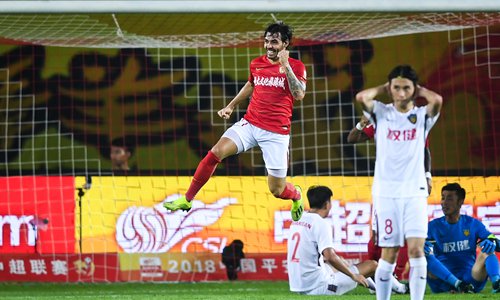HOME >> SPORTS
Is naturalizing foreign players the cure for China’s ailing soccer development?
By Wang Qi Source:Global Times Published: 2019/5/28 19:09:29

Guangzhou Evergrande striker Ricardo Goulart celebrates scoring against Tianjin Quanjian during their Chinese Super League match on August 19, 2018 in Guangzhou, Guangdong Province. Photo: IC
Brazilian soccer player Ricardo Goulart playing for Chinese Super League (CSL) giants Guangzhou Evergrande has agreed to become a naturalized Chinese citizen, the Shanghai-based Oriental Sports Daily reported on Monday.The news quickly soared to the top five hot topics on China's Twitter-like Sina Weibo and sparked a public discussion. For those who are keen to see Goulart bring his outstanding skills to China's struggling national team, the news will no doubt be cheered.
Since arriving in Guangzhou in 2015, Goulart has scored more than 100 goals and won eight trophies for his CSL team.
As China looks toward the Qatar World Cup in 2022 and attempts to meet coach Marcello Lippi's requirement for a quality striker, naturalizing star players like Goulart is a quick solution to improving the competitiveness of China's national team.
Beijing Guoan's Hou Yongyong (aka John Hou Sæter) and Li Ke (aka Nico Yennaris) were among the first batch of players to become naturalized Chinese citizens, as their Chinese descent makes it easier for public to welcome them.
But for a country with a population of 1.3 billion, naturalizing players actually reflects the failure of the country's soccer program to nurture and development its youth.
Although some believe that granting some players citizenship seems to conflict with the ethos of developing the country's young players, the practice has become more common in recent years.
Former Portugal internationals Deco and Pepe, former Italy international Thiago Motta, Spain international Diego Costa were all naturalized. In Asia, Japan has players who were born in Brazil and Qatar won the AFC Asian Cup this year with naturalized foreign players on its roster.
Those countries also attach equal importance to youth development, which contributed to their success in soccer.
What makes China's alleged naturalization of Goulart look like a short-sighted shortcut is the disappointment many people feel for the country's youth development, which they regard as the root and key to a country's soccer.
Launched by the Chinese Football Association in 2017, the U23 Policy requires the CSL and China League One (second-tier) clubs to increase the appearance of players under 23. In the 2019-20 season each club must guarantee at least three domestic U23 players will get a chance to play in each league game and at least one of them will be a starter.
The policy was criticized as many people believe it is not the fundamental solution to the youth development. Fans are tired and depressed to see clubs replacing two U23s near the end of a match due to a lack of capable young talent.
Ironically, two years after implementing the U23 policy, no U23 players were found in Lippi's squad for the AFC Asian Cup in January. Moreover, Lippi's team was the oldest of the 24 teams at the Asian cup, with nine players over 30.
Posted in: SOCCER